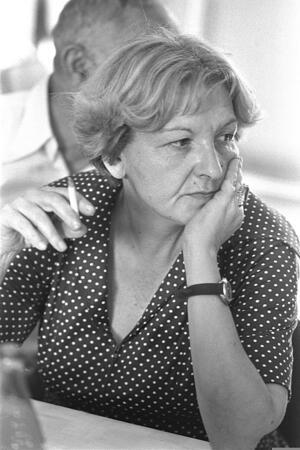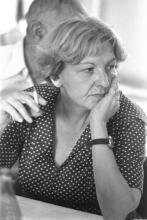Hanna Zemer
Hanna Zemer was born in to an ultra-Orthodox family in 1925 in Slovakia. She was imprisoned in the Ravensbruck concentration camp during the final months of World War II. Zemer then moved to Israel and began to work in journalism. She was first an editor and correspondent for Omer before working at the newspaper Davar. She quickly rose through the ranks of Davar and was chosen as editor-in-chief in 1970. She was the first woman to hold such a high position in Israeli media and politics. Zemer published books, wrote articles for many publications, and was elected a member of the board of the International Institute of Journalism. Her journalistic achievements won her many prizes and praise throughout public institutions and women’s organizations.
Overview and World War II Experience
Born in 1925 in Bratislava, Slovakia to an ultra-Orthodox family, Hanna Zemer (née Haberfeld) grew up in a strongly religious home. Her father, Rabbi Shlomo Haberfeld, was a prominent member of the ultra-Orthodox community in Pressburg and her grandfather, Rabbi Jacob Haberfeld, a descendant of religious scholars, was the rabbi of Tura Luka (Slovakia). Many years later, when Zemer reached the height of her career as editor of the newspaper Davar and as a leading journalist in Israel, she wrote a book about her travels in the Jewish world entitled God Doesn’t Live Here Anymore, which contained a rare account of her return visit to the Ravensbruck concentration camp where she was imprisoned during the final months of World War II.
On my travels abroad, and especially my trips to Germany, I am very careful not to eat treif. It’s a sort of demonstration of solidarity. But here at the doorway, at Ravensbruck, I would have eaten pork if I could have eaten at all. I would have eaten steak with cheese to take revenge on God for the deaths of my aunts and cousins, who counted the days of their Menstruation; the menstruant woman; ritual status of the menstruant woman.niddah time according to the law, separated During the Temple period, the dough set aside to be given to the priests. In post-Temple times, a small piece of dough set aside and burnt. In common parlance, the braided loaves blessed and eaten on the Sabbath and Festivals.hallah from the dough, ran to the Judge in Jewish law cases; member of a rabbinic court.dayyan with questions about a spot on a slaughtered goose, and read from the Ze’enah U-Re’enah every free moment—and their reward was to be humiliated to the dust and tortured until they perished. Five minutes from Ravensbruck, I would even have eaten a baby goat cooked in its mother’s milk. Instead, I took a Valium.
Hanna Zemer made several dramatic transitions during her life. She went from a comfortable, bourgeois world to the hell of the German death camps; from the languages of central Europe—German, Hungarian, Slovak and Czech—to Hebrew; and from the ultra-Orthodox world to the secular one, together with Zionism and the highest echelon of the Israel Labor Party (Mapai).
Immigration and Early Career
Hanna Zemer came to Israel after the war and was married briefly, changing her married name, Zomer, to Zemer. She worked as a teacher in the ultra-Orthodox Beth Jacob [Bais Ya’akov] school system in Azor (formerly Yazur) in southeastern Tel Aviv. Even after she left the ultra-Orthodox world she continued to keep The Jewish dietary laws delineating the permissible types of food and methods of their preparation.kashrut, lit candles every Friday night, and went to synagogue on festival days. Her second husband was David Zuta and she retained custody of their daughter Shulamit when they separated.
While still working as a teacher she began to serve as a night editor for a German newspaper published in Israel, Yedi’ot ha-Yom. In 1951 she was hired as a correspondent for Omer, a daily newspaper for new immigrants in vocalized Hebrew that was a supplement of Davar.
At Omer, Zemer took her first steps in the labyrinthine world of Israeli politics. She stood out almost immediately as an excellent reporter—quick, competitive, able to spot important new stories and a master of rich, incisive language. She moved from her job at Omer to a post on Davar’s writing staff, reported from the Lit. "assembly." The 120-member parliament of the State of Israel.Knesset, and was chosen as the paper’s political affairs correspondent. At the same time, she made contact with high-ranking members of Mapai such as David Ben-Gurion, Moshe Sharett, Levi Eshkol, Haim Zadok, and many others. These politicians made her their confidante, asked her advice—“not because of Davar but because of her wisdom,” as journalist Nahum Barnea once wrote of her.
Leadership at Davar
In 1961 Zemer returned from her term as a correspondent in the United States and was appointed director of Davar’s editorial board in Jerusalem. She also began to participate in current-affairs programs on the radio, winning immediate recognition for her fluency and sharp tongue. In time she became a radio and television host and a familiar figure in the electronic media.
From Davar’s editorial board in Jerusalem Zemer progressed to assistant editor under Yehudah Gotthelf and in 1970 was chosen as Davar’s editor-in-chief, the highest position held by a woman in Israeli media and politics at the time.
Hanna Zemer created a revolution at Davar, changing the traditional design of the newspaper, promoting young reporters, and infusing the writing with a fresh spirit. The previous editors of Davar, from Berl Katznelson (1887–1944), Zalman Shazar (1889–1974), and Haim Shurer (1895–1968) to Yehudah Gotthelf (1903–?), were first of all party members, ideologues, and politicians, and only then journalists. Zemer’s progress from a new immigrant reporter at Omer to the leadership of Davar was due only to her abilities and skills as a journalist. Though she was a member of Mapai and the Labor Party, she never saw herself as a politician, educator, or ideologue, but only as a journalist with a duty first and foremost to preserve her professional integrity.
She served as Davar’s editor-in-chief for twenty years—the first woman to hold such a position at a Hebrew newspaper. Sometimes she was offered important public positions, such as that of information minister in Yitzhak Rabin’s government in 1975, but she always chose to remain with the newspaper and maintain a living, daily connection with the world of news. Even when she was invited to official meetings, dinners, and formal receptions, she remained a journalist first, gathering material and calling the appropriate writer on the telephone to give him the material and ask him to check and report it.
Legacy and Recognition
Under Zemer’s leadership Davar became more open, expressing controversial opinions and fostering an entire generation of journalists. The best Israeli writers wrote for Davar. Zemer brought in two young authors, Amos Oz and Haim Be’er, whose writing for the newspaper played an important part in their literary careers. Some of the changes she made to the newspaper, such as Nahum Barnea’s reports for the “Diary” or the satirical supplement Davar Aher, became milestones in Israeli journalism and were imitated by other newspapers. The finely honed critical style had hardly ever been seen in Israeli journalism, certainly not at the conservative Davar.
Zemer published books, wrote articles for the Encyclopaedia Judaica and the Educational Encyclopedia, and was elected to serve as a board member of the International Institute of Journalism. Her journalistic achievements won her the Sokolow Prize, the Herzl Prize, the Nordau Prize, the Luria Prize, and praise throughout public institutions and women’s organizations. Even after her retirement she continued to publish essays in various newspapers and taught in the journalism and media department at Bar Ilan University.
Hanna Zemer died on March 6, 2003. She is survived by a daughter, Shulamit Zuta.




